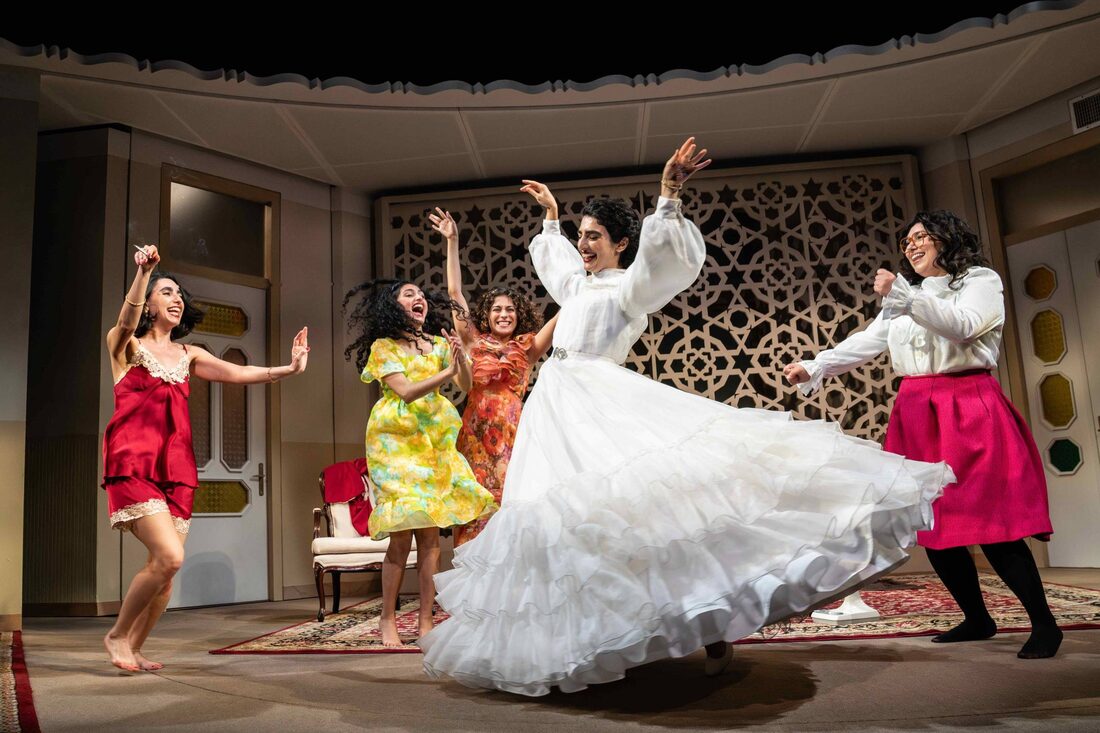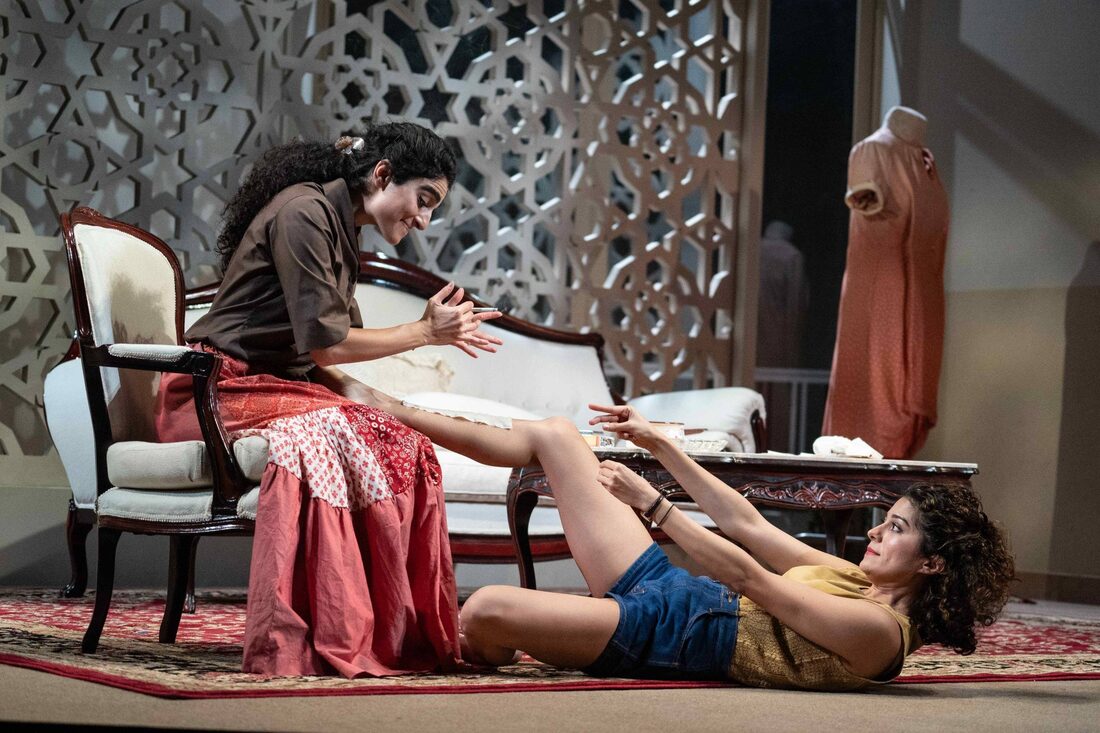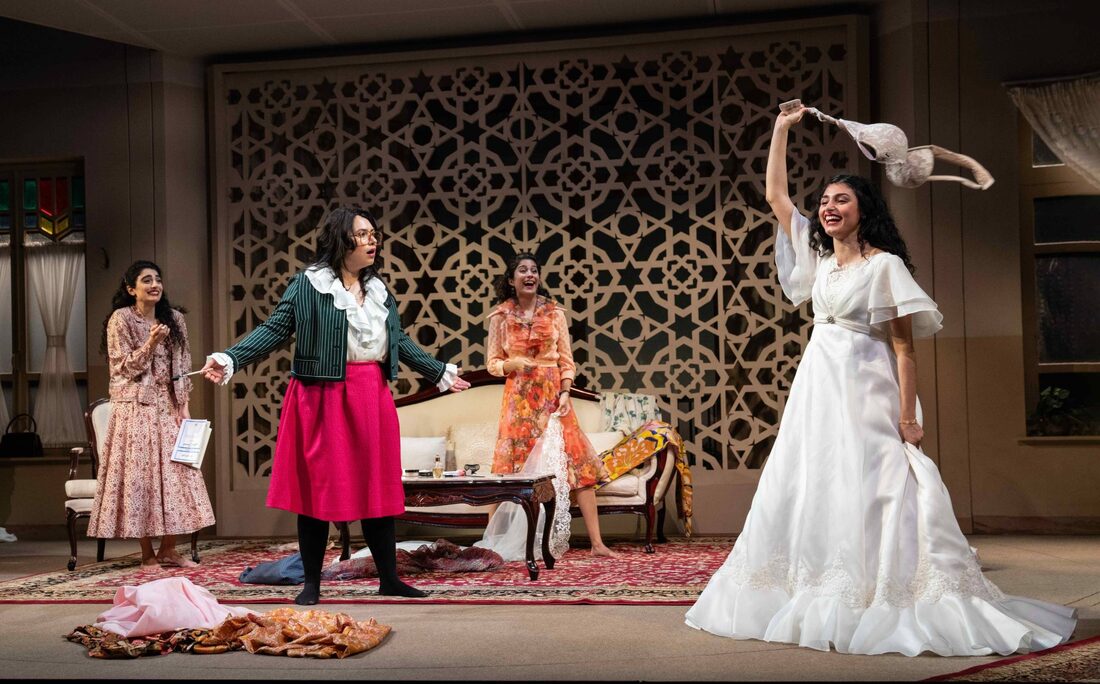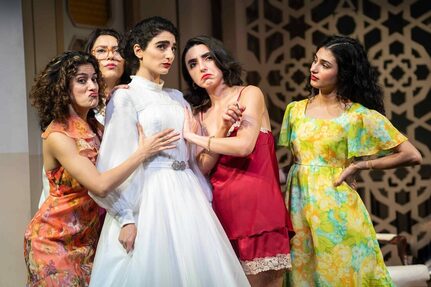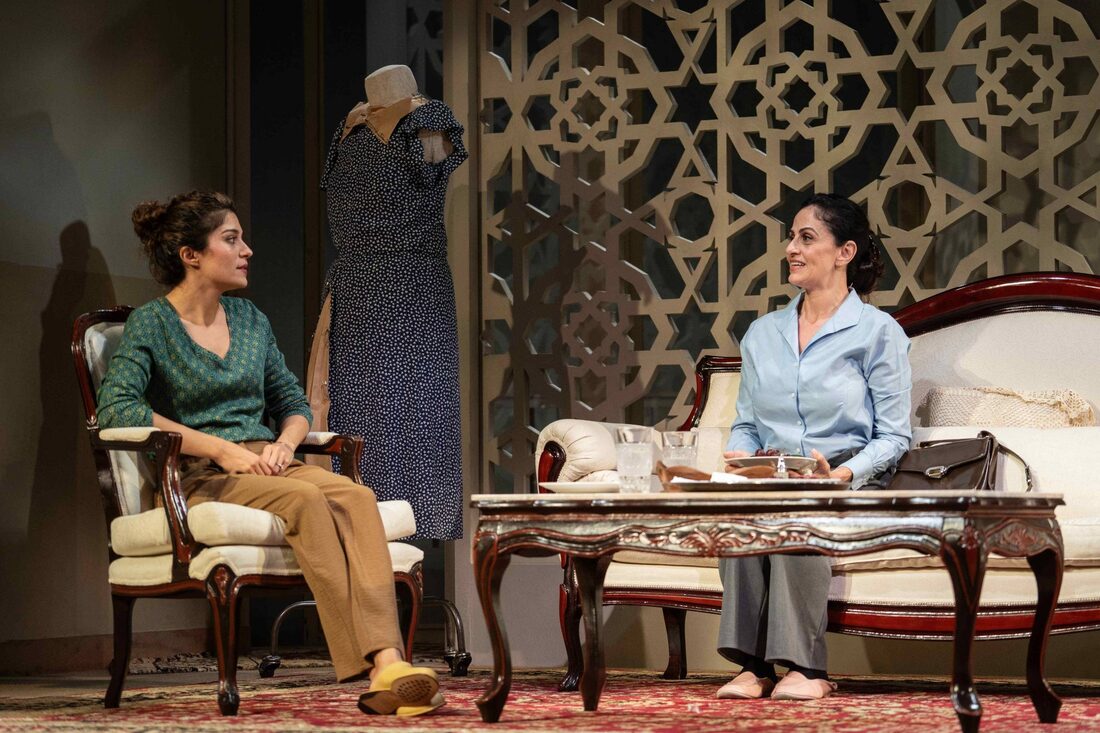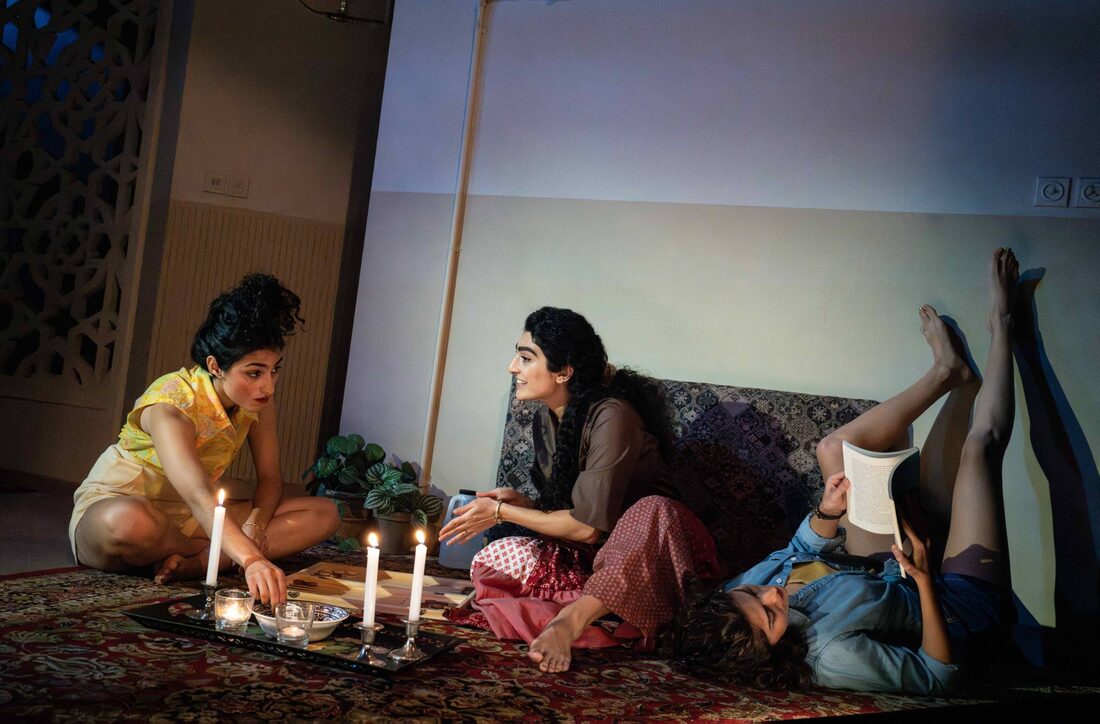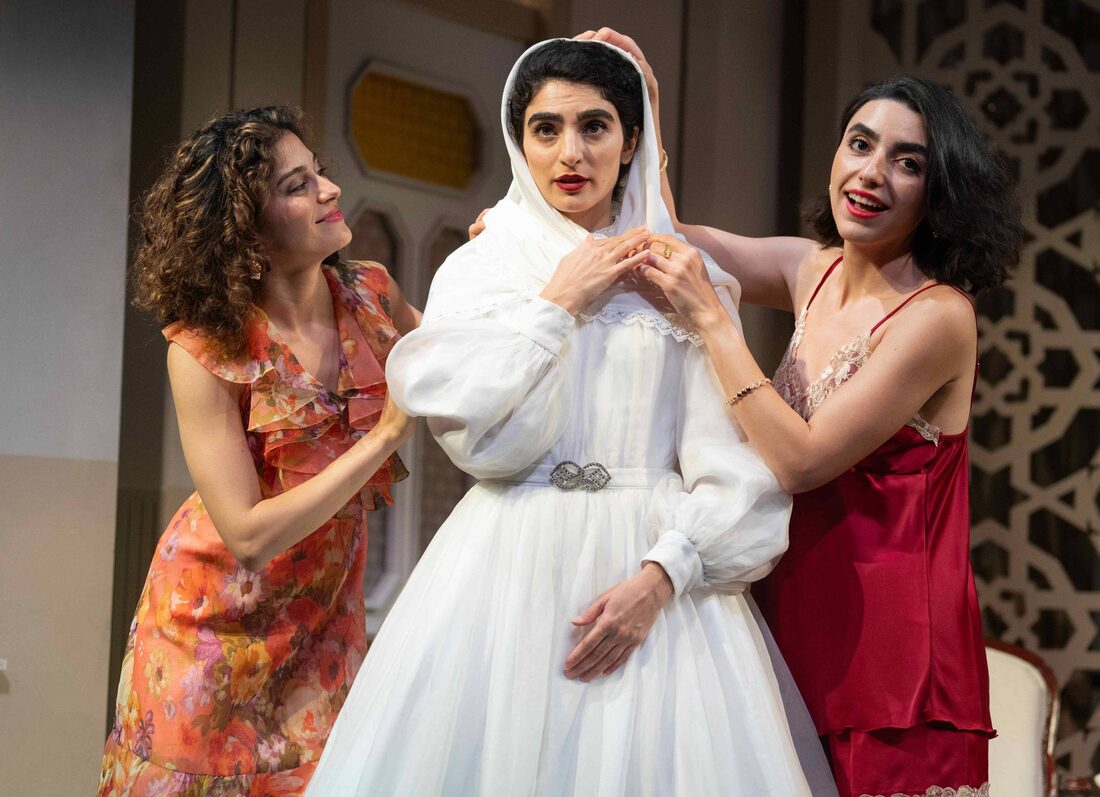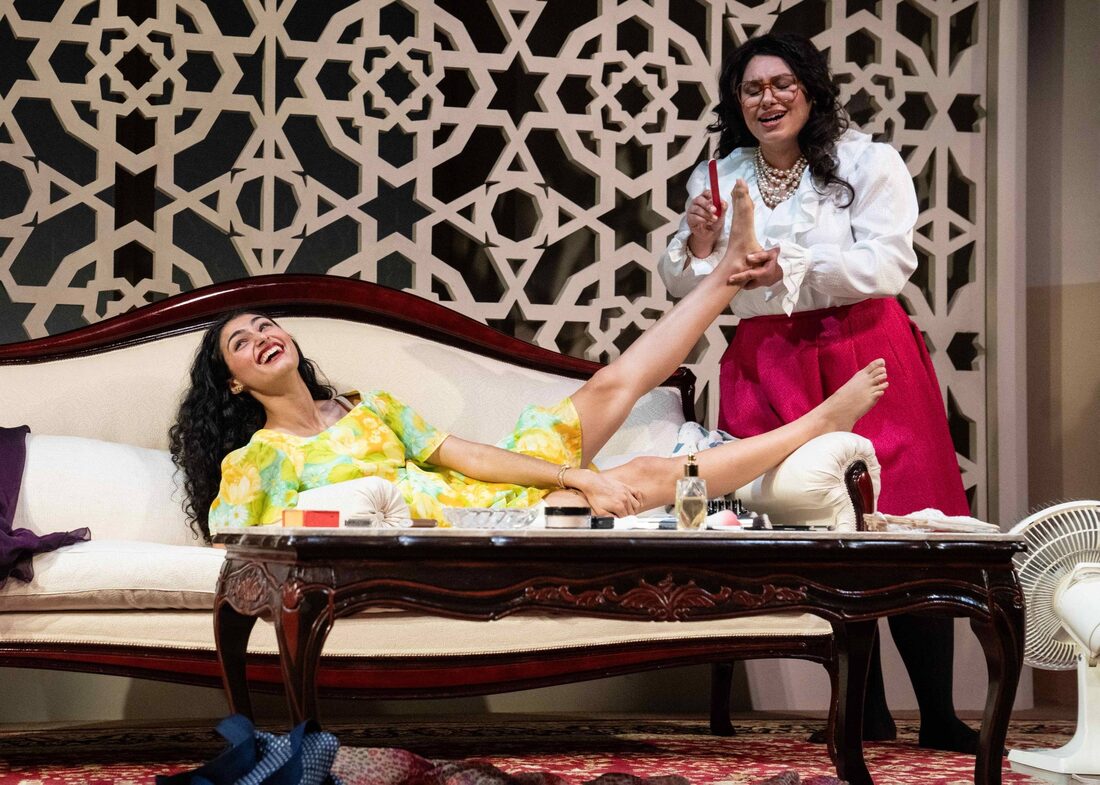POIGNANT NEW PLAY, WISH YOU WERE HERE, EXPLORES LOVE AND LOSS AMIDST REVOLUTION
By Kiersten Bjork (October 24, 2023)
Wish You Were Here is a touching new play from Sanaz Toossi, currently playing on the Yale Rep stage. Directed by Sivan Battat, Wish You Were Here tells the story of six women – best friends, loved ones, new friends – and their lives in Karaj, Iran from 1978 to 1991, before, during, and following the revolutions, protests, and violent responses of the period. It explores love, loss, identity, relationships, and so much more, all set against the backdrop of the looming societal changes taking place in the country.
Wish You Were Here is poignant, yet raucously humorous. It’s full of simple yet heartbreaking moments that speak volumes, but also features raunchy, laugh-out-loud comedic parts, and at the heart of it all are these women and their relationships. Each character is vastly different, and yet they are all women. They are all women living in the same society, with the same fears, with the same hesitations – though how they choose to respond is what splits them apart. I really enjoyed this play, most specifically for the dynamic, relatable, human female characters that are presented in it. This is a story about women – about female relationships, about expectations of women by society, about women’s perceptions of society, and so much more – and it’s truly a beautiful piece.
Wish You Were Here is a touching new play from Sanaz Toossi, currently playing on the Yale Rep stage. Directed by Sivan Battat, Wish You Were Here tells the story of six women – best friends, loved ones, new friends – and their lives in Karaj, Iran from 1978 to 1991, before, during, and following the revolutions, protests, and violent responses of the period. It explores love, loss, identity, relationships, and so much more, all set against the backdrop of the looming societal changes taking place in the country.
Wish You Were Here is poignant, yet raucously humorous. It’s full of simple yet heartbreaking moments that speak volumes, but also features raunchy, laugh-out-loud comedic parts, and at the heart of it all are these women and their relationships. Each character is vastly different, and yet they are all women. They are all women living in the same society, with the same fears, with the same hesitations – though how they choose to respond is what splits them apart. I really enjoyed this play, most specifically for the dynamic, relatable, human female characters that are presented in it. This is a story about women – about female relationships, about expectations of women by society, about women’s perceptions of society, and so much more – and it’s truly a beautiful piece.
The primary group of friends is made up of Salme, Zari, Nazanin, Shideh, and Rana, with “New Friend” being introduced toward the end of the play. Salme is played by Bahar Beihaghi, and her performance is lovely. Salme is sweet and kind, dubbed “too nice” by some of her friends, and Beihaghi plays her with grace and, in the earlier portions of the play, a charming naivety. I enjoyed the journey that Beihaghi took us on as Salme tries to determine her place in the group – she is the first to marry, the most outwardly religious (her noon prayers the focal point of a particularly striking, silent moment of the play), and the one who puts in the most effort to find a lost friend – all the while living with the ever-shifting social and political landscape of her country.
Ava Lalezarzadeh plays Zari, the energetic, if a bit silly, member of the friend group. Lalezarzadeh brings spunk to her role, depicting Zari with a very animated, youthful vibrancy. Zari plays into the sexual jokes, making her a rather humorous character for much of the show, but Lalezarzadeh also really digs into the shift that occurs later in the piece, imbuing Zari with a quiet sorrow as she questions why it is that Nazanin loves her.
Nazanin is portrayed by Anita Abdinezhad with a fierceness that is present throughout the show. Nazanin is strong, her commentary sometimes rather biting, and when she finds herself with fewer and fewer friends remaining, she is forced to reckon with the fact that she has been standing still while the world has moved around her. Her arc is particularly fascinating to watch because she strikes you as someone that is very much in control, and it is only as the play progresses that we realize how rooted in her past she is. As her friends marry, she vows never to marry or have children. As her friends apply for Green Cards, or go to study in America, she vows never to leave. Abdinezhad lives within this role with conviction and poise, simultaneously exuding a prickly attitude while also maintaining the raw grief – in regard to her friends, her country, her life – that Nazanin possesses at her core. Abdinezhad’s is a truly riveting performance to watch.
Ava Lalezarzadeh plays Zari, the energetic, if a bit silly, member of the friend group. Lalezarzadeh brings spunk to her role, depicting Zari with a very animated, youthful vibrancy. Zari plays into the sexual jokes, making her a rather humorous character for much of the show, but Lalezarzadeh also really digs into the shift that occurs later in the piece, imbuing Zari with a quiet sorrow as she questions why it is that Nazanin loves her.
Nazanin is portrayed by Anita Abdinezhad with a fierceness that is present throughout the show. Nazanin is strong, her commentary sometimes rather biting, and when she finds herself with fewer and fewer friends remaining, she is forced to reckon with the fact that she has been standing still while the world has moved around her. Her arc is particularly fascinating to watch because she strikes you as someone that is very much in control, and it is only as the play progresses that we realize how rooted in her past she is. As her friends marry, she vows never to marry or have children. As her friends apply for Green Cards, or go to study in America, she vows never to leave. Abdinezhad lives within this role with conviction and poise, simultaneously exuding a prickly attitude while also maintaining the raw grief – in regard to her friends, her country, her life – that Nazanin possesses at her core. Abdinezhad’s is a truly riveting performance to watch.
Shadee Vossoughi is quite funny as Shideh, the anxious, at times frantic friend who is studying to become a doctor. Her quips and moments of physical humor are enjoyable, and the way in which Vossoughi drives that comedic timing within the worry and the anxiety is wonderful to watch. Her choices in the scene during which she is jetlagged following a flight from the United States are particularly humorous. Vossoughi finds a strong balance between the comedy and the intense seriousness that Shideh possesses – she cares fiercely for her friends – weaving them together into a powerful final product.
Vaneh Assadourian brings us into the piece as Rana, her sharp, sarcastic wit on full display right from the start. Rana pokes fun at her friends, exuding a “ringleader” sort of energy in that first scene, and I enjoyed the toughness that Assadourian filled the role with. Rana reminded me of those girls growing up that others in the friend group always envied – the way that she carries herself with ease, the dynamic that she shares with Nazanin, the almost cavalier attitude that she demonstrates – before everything changes. Rana is a Jewish woman living in Iran during a time of great upheaval, and this takes the forefront of the story almost immediately. Rana makes a significant impact on the women around her, so much so that she still remains a prominent topic of conversation when she is no longer present.
The final woman in the play is simply referred to as “New Friend,” and is played by Sahar Bibiyan. Separate from that core group, as evidenced by her name, New Friend is present only with Nazanin, creating an interesting parallel between the two characters. Bibiyan plays New Friend with a soft confidence – a woman still figuring things out as she moves through life, but a woman who has faced incredible odds and triumphed – and when placed opposite Abdinezhad, it puts on full display how Nazanin has changed over the course of the play. We are left wondering if this is who Nazanin may have been if she chose a different path. All of the women in the play have been faced with a variety of complex choices, and many of those choices led them away from each other. Yet, New Friend arrives with the possibility of a new relationship, and Nazanin can choose to lean into that or not.
Vaneh Assadourian brings us into the piece as Rana, her sharp, sarcastic wit on full display right from the start. Rana pokes fun at her friends, exuding a “ringleader” sort of energy in that first scene, and I enjoyed the toughness that Assadourian filled the role with. Rana reminded me of those girls growing up that others in the friend group always envied – the way that she carries herself with ease, the dynamic that she shares with Nazanin, the almost cavalier attitude that she demonstrates – before everything changes. Rana is a Jewish woman living in Iran during a time of great upheaval, and this takes the forefront of the story almost immediately. Rana makes a significant impact on the women around her, so much so that she still remains a prominent topic of conversation when she is no longer present.
The final woman in the play is simply referred to as “New Friend,” and is played by Sahar Bibiyan. Separate from that core group, as evidenced by her name, New Friend is present only with Nazanin, creating an interesting parallel between the two characters. Bibiyan plays New Friend with a soft confidence – a woman still figuring things out as she moves through life, but a woman who has faced incredible odds and triumphed – and when placed opposite Abdinezhad, it puts on full display how Nazanin has changed over the course of the play. We are left wondering if this is who Nazanin may have been if she chose a different path. All of the women in the play have been faced with a variety of complex choices, and many of those choices led them away from each other. Yet, New Friend arrives with the possibility of a new relationship, and Nazanin can choose to lean into that or not.
Scenic design by Omid Akbari is elegant: simple yet refined. It features a couch, chair, and table that are rearranged to suit the homes of the different women, as well as an intricately patterned grate-like back wall. The surrounding walls and the patterned grate shift and move fluidly, gliding smoothly into different positions as we travel from living room to living room.
Lighting designer David Anthony-Ken DeCarolis creates a homey feel with soft, warm lighting for much of the piece. I particularly liked the choice for the scene in which candlelight is the only light source – the highlights and shadows created by this choice are gorgeous. Scene transitions are supported by projection design from Sam Skynner. The projections have an old-timey, film-like feel to them, the colors muted and edges soft as we catch a glimpse into a time when the five friends were carefree. The projections feel nostalgic, guiding the story as we transition to a new scene, a new location, and a new time.
Costumes by designer T. F. Dubois and hair design by Matthew Armentrout are excellent. The clothing shifts as time goes by and societal norms change, and I particularly loved the three different wedding dresses that feature in the production. Sound designer Mike Winch, who also created additional original music for the production, does strong work infusing music into the scene transitions and blending sounds such as sirens, radio music, and television broadcasts into the various scenes.
Lighting designer David Anthony-Ken DeCarolis creates a homey feel with soft, warm lighting for much of the piece. I particularly liked the choice for the scene in which candlelight is the only light source – the highlights and shadows created by this choice are gorgeous. Scene transitions are supported by projection design from Sam Skynner. The projections have an old-timey, film-like feel to them, the colors muted and edges soft as we catch a glimpse into a time when the five friends were carefree. The projections feel nostalgic, guiding the story as we transition to a new scene, a new location, and a new time.
Costumes by designer T. F. Dubois and hair design by Matthew Armentrout are excellent. The clothing shifts as time goes by and societal norms change, and I particularly loved the three different wedding dresses that feature in the production. Sound designer Mike Winch, who also created additional original music for the production, does strong work infusing music into the scene transitions and blending sounds such as sirens, radio music, and television broadcasts into the various scenes.
Wish You Were Here at Yale Rep is a story of tenderness and laughter, of pain and longing, of joy and grief. It is a picture of true life, a window into the world of these women as they grow and change, finding their way in a world torn apart by war and violence yet buoyed by the fact that they have each other. It navigates the female experience in a visceral, incredibly relatable way that I have not seen in many plays before, set against the backdrop of an important series of events in Iranian and world history. I highly recommend taking the time to catch Wish You Were Here at Yale Rep before it closes on October 28.
Wish You Were Here will run through October 28 at Yale Repertory Theatre in New Haven, CT. Curtain times are Tuesdays-Saturdays at 8:00pm, and Saturdays at 2:00pm. It has a runtime of 1 hour and 40 minutes with no intermission. Tickets are available through the Box Office (203.432.1234), or online at yalerep.org.
Kiersten Bjork is a theatremaker and reviewer (Connecticut Critics Circle) from Branford, CT.
Wish You Were Here will run through October 28 at Yale Repertory Theatre in New Haven, CT. Curtain times are Tuesdays-Saturdays at 8:00pm, and Saturdays at 2:00pm. It has a runtime of 1 hour and 40 minutes with no intermission. Tickets are available through the Box Office (203.432.1234), or online at yalerep.org.
Kiersten Bjork is a theatremaker and reviewer (Connecticut Critics Circle) from Branford, CT.
